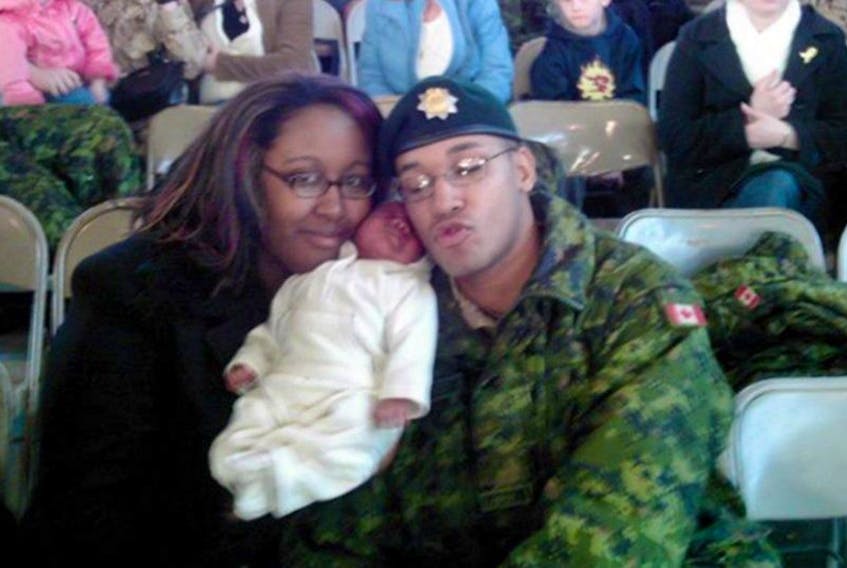GUYSBOROUGH, N.S. — Veterans Affairs Canada knew Lionel Desmond was still a very unhealthy man when he was released after a two-month stay at St. Anne’s Hospital in Quebec on August 15, 2016.
During a conference call a week earlier between those responsible for his care at the hospital and his Veterans Affairs case manager, they discussed that he was leaving inpatient care earlier than he should and that he would need significant further mental health supports and assessment upon his return to Upper Big Tracadie.
Then nothing appears to have been arranged for him for three months.
The Afghan War veteran — who a military doctor noted had “severe post-traumatic stress disorder” — went to live with a wife to whom he’d been married for a decade but due to his military service had spent little time actually sharing a house with.
Desmond also returned to a health-care system that had little experience working with young war veterans.
Veterans Affairs knew he didn’t have a backup plan if living with his wife didn’t work out, that he suffered from recurring nightmares, that head injuries suffered during his service made it difficult for him to concentrate or complete complex tasks and that he was subject to mood swings.
In the months that followed, Desmond’s mental health spiraled.
His complex medical history was not provided to the psychotherapist in Antigonish with whom Veterans Affairs finally made an appointment for Desmond on Dec. 2, 2016.
On Thursday, that psychotherapist, Catherine Chambers, started to cry as Nova Scotia provincial court Judge Warren Zimmer read her Desmond’s case history.
“In light of the information you’ve shared from this report, I don’t believe (Lionel Desmond) would have been a candidate for community-based psychotherapy,” said Chambers, who quickly collected herself on the stand.
“He would have required further inpatient care.”
Though the Desmond fatality inquiry is not meant to find fault, Zimmer took a dim view of the followup provided by Veterans Affairs following Desmond’s release from St. Anne’s.
“I want you to have an appreciation of what was known at the time he was discharged,” Zimmer told Chambers of his reasons behind reading the reports on Desmond’s mental health from the Quebec hospital.
“What was coming to you without you having any idea of who was coming to sit in your office.”
Chambers had two sessions with Desmond during which she sought to understand him.
She had anticipated needing at least six of these assessment sessions before moving toward the other phases of psychotherapy — stabilization, exploration of trauma and, finally, integration.
“It would have taken years,” testified Chambers.
What she learned on Thursday from Judge Zimmer was that Desmond wasn’t ready for the help she had to give and Veterans Affairs should have known it.
On Jan. 3, 2017, Chambers got a call from Desmond.
His wife, Shanna, wanted a divorce.
He was moving out of the family home in Upper Big Tracadie.
“I did not get the impression at the time that he posed an imminent risk based on the manner he answered the questions as well as the content of his answers,” testified Chambers, adding that she had in the past called police to escort other patients to the hospital.
So she made what in her field they call a safety contract with Desmond.
“If he felt overwhelmed and unable to cope, if his suicidal ideation became worse, that would be an indication to return to hospital,” said Chambers.
But he didn’t check himself into St. Martha’s Regional Hospital in Antigonish as he had two days before.
Instead he bought a gun and killed Shanna, his mother Brenda and daughter Aaliyah before shooting himself in the Upper Big Tracadie home he’d spent the previous day moving out of.
During the three weeks of testimony so far in the five weeks scheduled for the inquiry, much time has been spent on why Desmond did this.
He had told other mental health professionals of his love for Aaliyah and shown a desire in the past to protect and provide for Shanna. Two days before killing his daughter, he’d lamented to psychiatrist Faisal Rahman at St. Martha’s about having scared Aaliyah by banging on a table.
And there is no documented history of physical abuse toward Shanna — who had told another psychiatrist that she wasn’t afraid of her husband.
Chambers was asked to explain dissociative disorders by Crown prosecutor Allan Murray on Thursday.
“It happens at the level of the brain and nervous system,” explained Chambers.
“When you overwhelm the ability to cope the brain will disassociate — the person’s perceptions change, there’s a sense of time slowing down, a disconnection from the present moment.
Things feel (for them) like in a movie, feel surreal.”
Someone suffering from such an episode can do things completely out of character.
The incidents can be brought on by stress.
“In addition to (Desmond’s) long term trauma, there was a single incident trauma — the car accident. His wife wanted a divorce. How was he going to secure housing? How would he pay for it? All these could have played a role in a dissociative state?” said Murray.
To which Chambers responded, “Yes. I didn’t directly observe that, but it is possible.”









